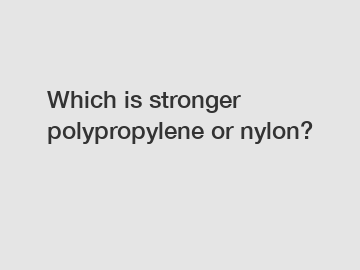Which is stronger polypropylene or nylon?
Which is stronger polypropylene or nylon?
In the world of materials, the strength of a product is often a crucial factor in determining its usefulness and longevity. When it comes to choosing between polypropylene and nylon, one might wonder which material is stronger. Both polypropylene and nylon have their own unique properties and strengths, making it important to understand the differences between the two before making a decision.
Polypropylene, a thermoplastic polymer, is known for its excellent chemical resistance, low density, and high melting point. It is commonly used in a variety of applications such as packaging, automotive parts, and even medical devices. On the other hand, nylon, a synthetic polymer, is renowned for its exceptional strength, resilience, and abrasion resistance. It finds its applications in various industries including textiles, as well as automotive and aerospace components.

To delve deeper into the topic, let's compare the strength of polypropylene and nylon across different aspects:
1. Tensile Strength:
Tensile strength is the maximum amount of tensile stress a material can withstand before breaking. In this regard, nylon triumphs over polypropylene. Nylon fibers are renowned for their high tensile strength, making them suitable for applications requiring strong, resilient materials. On the other hand, while polypropylene does have good tensile strength, it usually falls short when compared to nylon.
2. Impact Strength:
Impact strength is the ability of a material to withstand sudden impacts without breaking or deforming. In this aspect, polypropylene tends to have an edge over nylon. Polypropylene exhibits excellent impact resistance, making it a preferred choice in applications where durability is crucial. On the contrary, nylon may be prone to breakage or deformation under extreme impact conditions.
3. Resistance to Environmental Factors:
Polypropylene and nylon differ in terms of their resistance to various environmental factors. Polypropylene generally fares better in terms of resistance to chemicals and solvents, as it exhibits exceptional chemical resistance. This property makes it an excellent choice for containers and pipes in the chemical industry. Conversely, while nylon is also resistant to some chemicals, it may not offer the same level of resistance as polypropylene.
4. Fatigue Resistance:
Fatigue resistance refers to a material's ability to withstand repeated stress and cyclic loading without failure. Nylon showcases excellent fatigue resistance, whereas polypropylene may not offer the same level of performance under prolonged cyclic loading. This factor is especially important when considering the longevity of a product over an extended period, such as in automobile applications or textiles.
Considering these points, it becomes evident that both polypropylene and nylon possess their own unique strengths. While polypropylene exhibits better resistance to impact and chemicals, nylon surpasses in terms of tensile strength and fatigue resistance. Therefore, the decision regarding which material is stronger depends on the specific requirements of the application.
In conclusion, the strength of polypropylene or nylon is relative to the specific parameters being considered. One material may excel in one aspect while being surpassed by the other in a different area. As a result, understanding the unique properties and strengths of each material is crucial before making a choice. Evaluating the requirements of the application, such as tensile strength, impact resistance, and fatigue resistance, will enable one to determine which material is better suited for the intended purpose.
For more Is Polypropylene Strong, Polyethylene Rope Vs Polypropylene Rope, Hawser Rope for Saleinformation, please contact us. We will provide professional answers.

Comments
0